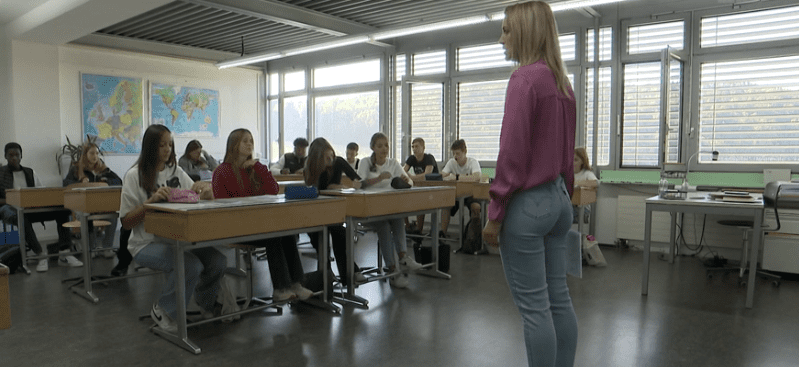

Das Volksschulamt in Graubünden verheimlicht den Mangel an Lehrkräften
Pascal Sigg / 13.08.2023
„Falsch und gefährlich,“ says the top teacher. Because in reality, fewer and fewer teachers in Graubünden are fully qualified. The new school year begins on Monday in the canton of Graubünden – and everything is fine. From the authorities‘ point of view, one cannot speak of a shortage of teachers in the canton of Graubünden. This was stated by Corinne Grieder from the Office for Primary Education and Sports (AVS) last Monday in the newspapers „Südostschweiz“ and „Bündner Tagblatt“ (paywall). The reason for the authorities‘ relief: only three positions are still vacant – a total of almost 100 full-time positions. However, recruitment has become more challenging in certain areas. The newspapers titled their „analysis“ with a big reassurance: „There are enough teachers in Graubünden – for now.“ „This statement is false upon closer examination. Furthermore, it is dangerous because it conveys that there is no need for action,“ writes Nora Kaiser, President of the Graubünden Teachers‘ Association (Legr), in response to an inquiry from Infosperber. The media focus on the only readily available number – the number of open positions – obscures the larger problem. The shortage of qualified teachers leads to an increasing number of inadequately trained individuals teaching in schools. Statistics show a trend: an increasing number are inadequately trained. The canton of Graubünden is also increasingly affected by this. This is shown by the survey of the level of education of Swiss school staff, which is carried out annually by the Federal Statistical Office (FSO). Since 2010, it has been recording how many teachers – in full-time equivalents – are fully qualified for the profession and how many are not (Infosperber reported in detail). The problem with the statistics: they are not particularly attractive for media coverage because they never reflect the current situation. They are always published more than six months after the end of the corresponding school year. So we will only have figures for the situation in Graubünden next week in a year and a half. However, it can show a trend. In Graubünden, it looks like this according to the statistics: In primary level 1 – 2, i.e., in kindergarten, the proportion of teachers who are not fully qualified has been increasing slightly for years. In the 2018/19 school year, it was still 0.9 percent. The latest figures from the 2021/22 school year show 3 percent. In primary level 3-8, i.e., in grades 1 to 6, the proportion of inadequately trained teachers has remained stable at around two and a half percent since 2018. However, the numbers are high at the secondary level. In the previous school year, over 15 percent of teachers were not fully qualified. Inter-cantonal comparisons are imprecise because the cantons do not record the numbers uniformly. However, the canton of Bern recently reported over 30 percent of teachers in this category. Graubünden’s Office for Primary Education and Sports does not provide any information. In response to an inquiry from Infosperber, the Graubünden Office for Primary Education and Sports does not address this statistic and sticks to its presentation. Since there are no more positions open, one cannot speak of a shortage of teachers. Almost all people who teach in the canton of Graubünden have a pedagogical education. In addition, teachers who are not trained for the corresponding level (for example, primary school teachers in secondary school) must apply for a teaching permit from the AVS. Infosperber therefore wanted to know from the AVS: How many teaching permits has the office issued for the upcoming school year? The AVS replied: „We cannot provide any further information on the number of teaching permits issued.“ Lack of qualification weakens teaching Nora Kaiser from Legr criticizes: „The trend of more and more teachers being inadequately trained endangers the quality of teaching, the atmosphere in teaching teams, and can lead to frustration when teachers are not remunerated according to their responsibilities due to a lack of qualification.“ This is particularly acute in the Romansh-speaking areas. „If teachers do not master the local idiom or lack pedagogical training, the quality of teaching suffers,“ says Kaiser. There is also another problem that is more difficult to capture statistically: many teachers work far beyond the desired workload. School management persuades them to increase their workload in order not to let the team down. Many inadequately qualified teachers therefore lack the time to obtain the necessary diploma through part-time study. This can also lead to frustration in the long term and, in the worst case, to those affected leaving the teaching profession. Media memory loss However, it is becoming increasingly rare for the media to uncritically rely on authorities when reporting on the shortage of teachers. The Zürcher Unterländer recently compiled a comprehensive article (paywall) on which schools employ a particularly large number of inadequately trained teachers. In a municipality whose school board did not provide any information, the journalist obtained information from parents. SRF Rendez-vous provided an overview of the open positions in all German-speaking cantons and critically pointed out that the shortage of teachers has a negative impact on the quality of teaching. In many places, the shortage of teachers still appears to be a force of nature. A purely demographic problem, too big to solve. Curiously, in the canton of Graubünden, even the media’s short-term memory seems to be affected. Just over four months ago, the same newspapers that are now reassuring referred to the situation in Graubünden as „precarious.“ The main source was the former president of the Graubünden Teachers‘ Association, Laura Lutz. One of the reasons for the situation, according to her, was that Graubünden pays the lowest salaries in the entire German-speaking Switzerland. The teachers now want to change this through the upcoming partial revision of the School Act
Original Artikel Teaser
Bündner Volksschulamt verschleiert Lehrkräftemangel
Pascal Sigg / 13.08.2023 «Falsch und gefährlich», findet die oberste Lehrerin. Denn tatsächlich sind immer weniger Bündner Lehrpersonen voll qualifiziert. Im Kanton Graubünden beginnt am Montag das neue Schuljahr – und alles ist bestens. Aus Behördensicht könne man im Kanton Graubünden nicht von einem Lehrpersonenmangel sprechen. Dies sagte Corinne Grieder vom Amt für Volksschule und Sport (AVS) am vergangenen Montag in den Zeitungen «Südostschweiz» und «Bündner Tagblatt» (Paywall). Der Grund fürs behördliche Aufatmen: Nur noch drei Stellen seien unbesetzt – insgesamt knapp 100 Stellenprozente. Allerdings sei die Rekrutierung punktuell schon herausfordernder geworden. Die Zeitungen übertitelten ihre «Analyse» gross mit einer Entwarnung: «In Graubünden hat es genug Lehrpersonen – bis jetzt.» «Diese Aussage ist bei genauerer Betrachtung falsch. Zudem ist sie gefährlich
Details zu Bündner Volksschulamt verschleiert Lehrkräftemangel









![sen.-katie-britt:-our-enemies-are-emboldened-by-[biden’s]-presidency](https://b2400116.smushcdn.com/2400116/wp-content/uploads/2024/05/1221089-sen-katie-britt-our-enemies-are-emboldened-by-bidens-presidency-480x272.jpg?lossy=2&strip=1&webp=1)